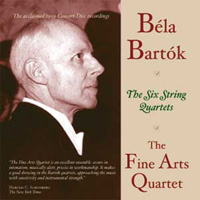 |
| February 1, 2006 Treasureable Bartók Quartets
The FAQ, originally formed as a performing unit of the American Broadcasting Company in 1946, was thus contemporaneous with the revered Hollywood Quartet and achieved a similar status, but while the HSQ disbanded in 1961, the FAQ had by then established a regular concert series in Chicago, and two years later took up residence at the University of Wisconsin at Milwaukee. The FAQ recorded the Mozart and Brahms clarinet quintets with Reginald Kell for American Decca, when the group was still part of ABC, but began recording in earnest only with the creation of Concert-Tapes, the open-reel forerunner of Concert-Disc. On their own label the FAQ men recorded all the quartets of Beethoven, Brahms and Mendelssohn as well as the Bartók cycle and a good deal else -- including the Mozart Oboe Quartet with Ray Still, the same composer’s Horn Quintet with John Barrows, and the four Flute Quartets with Samuel Baron. The group’s leader, Leonard Sorkin, was actually the engineer for some of the sessions, and some later ones were produced by the legendary Bert Whyte. The company was bought by Everest in the 1960s, and eventually the Beethoven cycle turned up on Vanguard/Everest CDs, while some of the other material was reissued on Wayne Wadhams’s Boston Skyline label. What many collectors kept hoping for, though, was the Bartók cycle. Bartók was always prominent in the FAQ’s repertory, and for many listeners the identity of these performers with this repertory was one of those mystically "foreordained" combinations. Two of the original members -- Leonard Sorkin, the leader, and George Sopkin, the cellist -- are in the Bartók cycle, as is Abram Loft, who was still with them when the group moved to Milwaukee; at that point Irving Ilmer, the violist in the Bartók, dropped out and was replaced by Gerald Stanick, who was in turn replaced five years later by Bernard Zaslav. During the 1970s the foursome so constituted recorded several sets of Haydn quartets and all the Mozart viola quintets for Vox. (The Quintets are also available from Music & Arts now.) There were along the way recordings for American Decca, Columbia, and other labels. Today there is still a Fine Arts Quartet at Milwaukee, but it is an entirely different group, with none of the members cited above; of those in the Bartók set, only Loft and Sopkin are with us today.
The sound quality of those 27 minutes leaves a bit to be desired, but the material is enlightening, and the six performances themselves, from the Concert-Disc tapes, have been effectively restored by Maggi Payne, allowing the vitality and utter absorption of the performances to come through as powerfully as they did from the LPs some 45 years ago. To be sure, there are more recent sets of this music that bring us fine, convincing performances, with the advantage of more strikingly realistic sound (both the Juilliard and the Végh remade the cycle, the Tokyo Quartet has done it twice, etc.), but this set is more than a merely sentimental or historical document: overall it is a vivid and valuable reminder of one of the chief glories of chamber music. By its very nature, this category of music-making tends more than others to rule out the idea of music as a "vehicle" for a virtuoso performer, in favor of recognizing that the music at hand has an importance far greater than that of its interpreters, who are thus obliged to commit themselves utterly and unstintingly to getting as deep inside it as possible and bringing its essence to the listener as clearly and persuasively as possible, and on its own terms. That is what the FAQ did in recording these quartets, and what they found in this music is still very much worth hearing. This is in fact something we might have expected to reappear on CD 20 years ago; it is no less welcome today -- and the three-disc set is offered at the price of two. ...Richard Freed
Ultra Audio is part of the SoundStage! Network. |
 A little more than 50 years ago, a music
critic in England suggested that in respect to string quartets we acknowledge a new set of
"Three Bs": viz., Beethoven, Bartók, and Bloch. Regrettably, the five quartets
of Ernest Bloch have yet to make their way into the so-called standard repertory, but the
six of Béla Bartók do seem to be as firmly established there as the quartets of
Beethoven. American musicians can take much of the credit for this. Back in 1949 or
’50, Columbia Records, in one of its earliest LP productions, issued the first
integral set of the Bartók Quartets, performed by the Juilliard Quartet. (The Juilliard
itself had just been formed; this may have been the group’s first recording.) As the
‘50s passed, Westminster issued a similar set with the Parrenin Quartet of Paris, the
first of the Végh Quartet’s recorded surveys of the Bartók cycle appeared on Angel,
and then, in 1959, only the fourth such presentation, and the first one in stereo: the
Fine Arts Quartet on its own label, Concert-Disc. The FAQ cycle has just been reissued by
Music & Arts [CD-1176, three discs], and it is self-recommending to anyone more than
casually interested in this material.
A little more than 50 years ago, a music
critic in England suggested that in respect to string quartets we acknowledge a new set of
"Three Bs": viz., Beethoven, Bartók, and Bloch. Regrettably, the five quartets
of Ernest Bloch have yet to make their way into the so-called standard repertory, but the
six of Béla Bartók do seem to be as firmly established there as the quartets of
Beethoven. American musicians can take much of the credit for this. Back in 1949 or
’50, Columbia Records, in one of its earliest LP productions, issued the first
integral set of the Bartók Quartets, performed by the Juilliard Quartet. (The Juilliard
itself had just been formed; this may have been the group’s first recording.) As the
‘50s passed, Westminster issued a similar set with the Parrenin Quartet of Paris, the
first of the Végh Quartet’s recorded surveys of the Bartók cycle appeared on Angel,
and then, in 1959, only the fourth such presentation, and the first one in stereo: the
Fine Arts Quartet on its own label, Concert-Disc. The FAQ cycle has just been reissued by
Music & Arts [CD-1176, three discs], and it is self-recommending to anyone more than
casually interested in this material. It was from Sopkin, in fact
(now 91 and still active in Maine), that Music & Arts obtained the original tapes for
these recordings, and for the reissue Abram Loft has adapted his exceptionally
illuminating annotation from the original LP set, in which the enthusiasm felt by him and
his colleagues comes through most persuasively. It comes through also in the little bonus
on the last of these three CDs. During its Chicago years, the FAQ did a good deal of
broadcasting, on both radio and television, and the broadcasts included illustrative
discussion among the musicians and their knowledgeable on-air host Norman Pellegrini.
Since these performances of the six quartets would not quite fit on two CDs or quite fill
three, the set concludes with 27 minutes of comments, explanations and demonstrations from
a television broadcast of Bartók’s Quartet No.1.
It was from Sopkin, in fact
(now 91 and still active in Maine), that Music & Arts obtained the original tapes for
these recordings, and for the reissue Abram Loft has adapted his exceptionally
illuminating annotation from the original LP set, in which the enthusiasm felt by him and
his colleagues comes through most persuasively. It comes through also in the little bonus
on the last of these three CDs. During its Chicago years, the FAQ did a good deal of
broadcasting, on both radio and television, and the broadcasts included illustrative
discussion among the musicians and their knowledgeable on-air host Norman Pellegrini.
Since these performances of the six quartets would not quite fit on two CDs or quite fill
three, the set concludes with 27 minutes of comments, explanations and demonstrations from
a television broadcast of Bartók’s Quartet No.1.